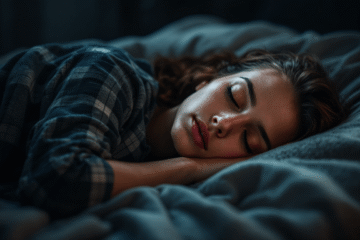In today’s fast-paced and constantly connected world, getting a good night’s sleep can often feel like a luxury. However, prioritizing sleep hygiene is essential for maintaining overall health and well-being. Sleep hygiene refers to the practices and habits that promote healthy sleep patterns.
Master Sleep Hygiene
By establishing a consistent sleep schedule, creating a sleep-friendly environment, practicing relaxation techniques, and managing stress, individuals can optimize their sleep hygiene and enjoy the benefits of a restful night’s sleep. This article will explore the best tips for optimal sleep hygiene and provide practical advice for maintaining a healthy sleep routine.
The importance of sleep hygiene
Sleep hygiene is crucial for overall health and well-being. Adequate sleep is essential for the proper functioning of our bodies and minds. During sleep, our bodies repair and regenerate, and our brains consolidate memories and process information. However, many individuals neglect the importance of sleep hygiene and suffer from sleep disturbances, such as insomnia or poor sleep quality.
Establishing a consistent sleep schedule is a key component of sleep hygiene. Going to bed and waking up at the same time every day helps regulate our body’s internal clock, making it easier to fall asleep and wake up naturally.
Sleepon is the ultimate game-changer in the world of sleep management!
1. Establishing a consistent sleep schedule and routine
One of the most effective ways to improve sleep hygiene is by establishing a consistent sleep schedule and routine. Our bodies have an internal clock, known as the circadian rhythm, which regulates our sleep-wake cycle. By going to bed and waking up at the same time every day, even on weekends, we can help synchronize our internal clock and promote better sleep. It is important to prioritize getting the recommended amount of sleep for our age group, which is typically between 7 and 9 hours for adults.
In addition to a consistent sleep schedule, having a bedtime routine can signal to our bodies that it is time to wind down and prepare for sleep. This routine can include activities such as reading a book, taking a warm bath, or practicing relaxation techniques. By establishing a consistent sleep schedule and routine, individuals can train their bodies to recognize when it is time to sleep, leading to improved sleep quality and overall sleep hygiene.
Go2Sleep 3: The Ultimate Sleep Companion
The Go2Sleep 3 revolutionary home sleep monitor is designed to monitor and improve your sleep quality with its comfortable, widened ring holder and advanced algorithms for precise monitoring of blood oxygen, heart rate, and blood glucose.
2. Creating a sleep-friendly environment
Creating a sleep-friendly environment is another important aspect of sleep hygiene. Our surroundings can greatly impact our ability to fall asleep and stay asleep throughout the night. Firstly, it is important to keep the bedroom cool, as a lower temperature promotes better sleep. Additionally, making the room as dark as possible can help signal to our bodies that it is time to sleep. This can be achieved by using blackout curtains or wearing an eye mask.
Keeping the bedroom quiet is also crucial for restful sleep. If external noises are a problem, using earplugs or a white noise machine can help drown out disruptive sounds. Investing in a comfortable mattress and pillows that support our individual sleep preferences is also essential.
Lastly, it is important to minimize the use of electronic devices in the bedroom, as the blue light emitted by screens can interfere with our sleep-wake cycle. By creating a sleep-friendly environment, individuals can optimize their sleep hygiene and improve the quality of their sleep.
Sleepon is the ultimate game-changer in the world of sleep management!
3. Practicing relaxation techniques and managing stress for better sleep
Practicing relaxation techniques and managing stress are crucial for promoting better sleep and maintaining optimal sleep hygiene. High levels of stress and anxiety can make it difficult to fall asleep and stay asleep throughout the night. Therefore, it is important to incorporate relaxation techniques into our daily routine. Deep breathing exercises, progressive muscle relaxation, and meditation are effective techniques that can help calm the mind and prepare the body for sleep.
Engaging in stress-reducing activities during the day, such as exercise, yoga, or spending time in nature, can also help promote better sleep at night. It is important to establish a bedtime routine that includes these relaxation techniques to signal to our bodies that it is time to unwind and prepare for sleep.
Additionally, managing stress throughout the day is essential for maintaining healthy sleep patterns. This can be achieved by practicing time management, setting boundaries, and engaging in activities that bring joy and relaxation. By incorporating relaxation techniques and effectively managing stress, individuals can improve their sleep quality and overall sleep hygiene.
Why We Sleep Book by Matthew Walker
Ever wondered why you can’t function without your daily dose of Z’s? Matthew Walker’s Why We Sleep holds the answers! This illuminating read explores the mysteries of sleep, blending scientific insights with practical tips, all wrapped in an engaging narrative. You’ll never look at your pillow the same way again!
Why We Sleep4. Other tips for improving sleep hygiene and maintaining a healthy sleep routine
In addition to the aforementioned tips, several other strategies can help improve sleep hygiene and maintain a healthy sleep routine. First, it is important to limit the consumption of stimulants such as caffeine and nicotine, especially in the evening, as they can interfere with sleep.
It is also advisable to avoid heavy meals and excessive fluid intake close to bedtime to prevent discomfort and frequent trips to the bathroom. Establishing a relaxing bedtime routine that includes activities such as reading a book or taking a warm bath can signal the body to wind down and prepare for sleep.
Furthermore, it is important to create a comfortable sleep environment by investing in a supportive mattress and pillows, as well as using breathable bedding. Finally, it can be helpful to limit exposure to screens, such as smartphones and tablets, before bed, as the blue light emitted by these devices can disrupt the sleep-wake cycle. By implementing these additional tips, individuals can further improve their sleep hygiene and maintain a healthy sleep routine.
Sleepon is the ultimate game-changer in the world of sleep management!
Prioritizing sleep hygiene is essential for optimal health and well-being. By establishing a consistent sleep schedule and routine, creating a sleep-friendly environment, practicing relaxation techniques, and managing stress, individuals can improve their sleep quality and maintain a healthy sleep routine. Adequate sleep is crucial for the proper functioning of our bodies and minds, allowing for physical repair, memory consolidation, and overall rejuvenation.
By following these tips and incorporating them into our daily lives, we can optimize our sleep hygiene and enjoy the benefits of a restful night’s sleep. Improved sleep can lead to increased energy levels, enhanced cognitive function, improved mood, and better overall health. So, let us prioritize our sleep, implement these strategies, and make sleep hygiene a non-negotiable aspect of our daily lives. Remember, a good night’s sleep is not a luxury, but a necessity for our well-being.
Frequently Asked Questions:
How does stress management impact sleep hygiene?
Managing stress effectively through activities like exercise, yoga, or spending time in nature reduces anxiety and tension, which can otherwise hinder your ability to fall asleep and stay asleep, thereby improving your overall sleep hygiene.
What additional tips can help me maintain a healthy sleep routine?
Additional tips include limiting caffeine and nicotine intake, avoiding heavy meals and excessive fluids close to bedtime, establishing a calming bedtime routine, and creating a supportive sleep environment to promote consistent and restful sleep.
What relaxation techniques can help improve my sleep hygiene?
Practicing relaxation techniques such as deep breathing exercises, progressive muscle relaxation, and meditation can calm your mind and body, helping you fall asleep more easily and enhancing sleep quality.
How can I create a sleep-friendly environment to improve my sleep quality?
To create a sleep-friendly environment, keep your bedroom cool, dark, and quiet; use blackout curtains or an eye mask; invest in a comfortable mattress and pillows; and minimize electronic device use before bed to minimize blue light exposure that can interfere with sleep
Why is establishing a consistent sleep schedule important for sleep hygiene?
Establishing a consistent sleep schedule helps regulate your body’s internal clock, known as the circadian rhythm, which promotes better sleep by aligning your sleep-wake cycle and making it easier to fall asleep and wake up naturally.
References:
- (2017, May 19). Short- and long-term health consequences of sleep disruption. – NCBI – NIH.
- (n.d.). The Extraordinary Importance of Sleep – NCBI – NIH.
- (2018, November 27). Sleeping hours: what is the ideal number, and how does age impact this? – NCBI – NIH.
- (2016, December 20). Sleep, Health, and Society – NCBI – NIH.
Body, Mind, And Soul For A Fulfilled Life!






